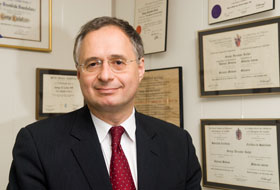  |
| HOME | THIS ISSUE | CALENDAR | GRANTS | BACK ISSUES | < BACK | NEXT > |
Center’s focus is on healthy agingby Maureen McGuire - October 2, 2006 | ||||
| Geriatrics, the study and care of older patients, is one of today's youngest medical specialties. And as it has evolved, the UConn Center on Aging has become a hub of excellence in clinical care, research, and education. Today, the Center on Aging has more board-certified geriatricians than any other practice in the region, as well as an impressive portfolio of clinical, basic, and population-based research studies funded by federal, state, and foundation grants. "The first national board exam in geriatrics took place in 1988, only 18 years ago," says Dr. George Kuchel, director of the UConn Center on Aging, which celebrates its 20th anniversary this year. "While the challenges and opportunities facing our discipline remain unprecedented, a great deal has been accomplished in recent years. "The good news," Kuchel says, "is that Americans are living longer. Our goal is to help people live as independently as possible so they can travel, pursue hobbies, spend time with family and friends, contribute to their communities - and fully enjoy their golden years." Focus on healthy aging The focus of the practice is two-fold, Kuchel says. For many patients in the practice, the emphasis is on developing strategies for healthy aging. For elderly patients who are frail, the focus is on coordinated care, oversight during hospitalizations, and management of multiple health issues. "It is never too early, and rarely too late, to consider strategies for healthier aging," says Kuchel. "This type of approach to prevention has to look at the whole person, and must be highly individualized. It's important to address lifestyle choices, such as getting regular exercise, maintaining a healthy and diverse diet, plus staying mentally active through individuals' careers, volunteer work, hobbies, or challenging mental exercises like crossword puzzles." Preventive care also means monitoring patients, and making sure they are up to date with appropriate screening tests and vaccinations, he says. For many older patients, physicians with Geriatrics Associates take a very active role in managing their complex health concerns. "It's never just a memory problem or just a high blood pressure problem," Kuchel says. "It's typically a combination of multiple medical conditions that cross traditional organ- or discipline-based boundaries and often require specialized attention. That's why we look at the whole person and how different medical, social, and family issues interact." Geriatrics Associates are also able to draw upon the expertise of colleagues at the Health Center in many areas, including neurology, urology, cardiology, and nursing. Research for a
stronger tomorrow One area is the study of inflammatory and hormonal factors that contribute to the decline of key tissues with aging.
"Loss of bone mass (osteoporosis) raises the risk of hip fracture, while declines in muscle quantity and quality (sarcopenia) contribute to mobility problems when skeletal muscle is affected, and to voiding difficulties when the bladder is involved," Kuchel says. "The overarching objective of all our efforts is to discover, refine, and test interventions that will avoid or delay frailty and disability, improving individuals' chances of successful and independent living." The Center's efforts are consistent with the NIH Roadmap initiative, since they have long included collaborative interdisciplinary partnerships between investigators from different backgrounds and disciplines. For example, research at the Center on Aging has shown that exercise can help to prevent loss of bone and muscle. A by-product of this research is an exercise program - Powerful Aging - that is offered in several locations in the greater Hartford area. Other research specialties include urinary incontinence, gait and balance problems, depression, the role of hormones in the aging process and inflammation. In addition, the Center on Aging is conducting community-based research to study clinical outcomes in real-world settings and to address disproportionate disability among racial and ethnic minorities. Center researchers also collaborate with basic scientists who are looking at issues such as why or how people age. "That is the beauty of being part of an academic medical center," says Kuchel. "We are able to work cooperatively on many different approaches to research, with an underlying goal of finding ways to help people age both gracefully and independently." Long-term impact More than 70 physicians trained in internal or family medicine have completed this program, and have then assumed leadership positions throughout the U.S. and overseas. "The training and career development of our fellows and junior faculty will always remain a top priority," says Kuchel, "since many, if not most, will need to assume leadership roles in terms of clinical care, education, or research, if we as a nation are to have any chance of responding to the demographic challenges facing us in the coming years." Many experts are predicting a nationwide shortage of geriatricians within the next 25 years. "Given current demographic trends, as well as the size of existing training programs and anticipated retirements, a manpower deficit of 25,000 geriatricians is expected by 2030 unless effective steps are taken," Kuchel says, referring to a recent report by the Alliance for Aging Research. He adds that the Center on Aging has the potential to help the State of Connecticut realize far-reaching savings in its long-term care costs. "The cost of long-term care represents the second largest single item in the state budget," he says. "By helping men and women live longer, healthier lives, and delaying the need for nursing home placement by even a modest five percent, we could help the state save almost $100 million annually." |
| ADVANCE HOME UCONN HOME |

